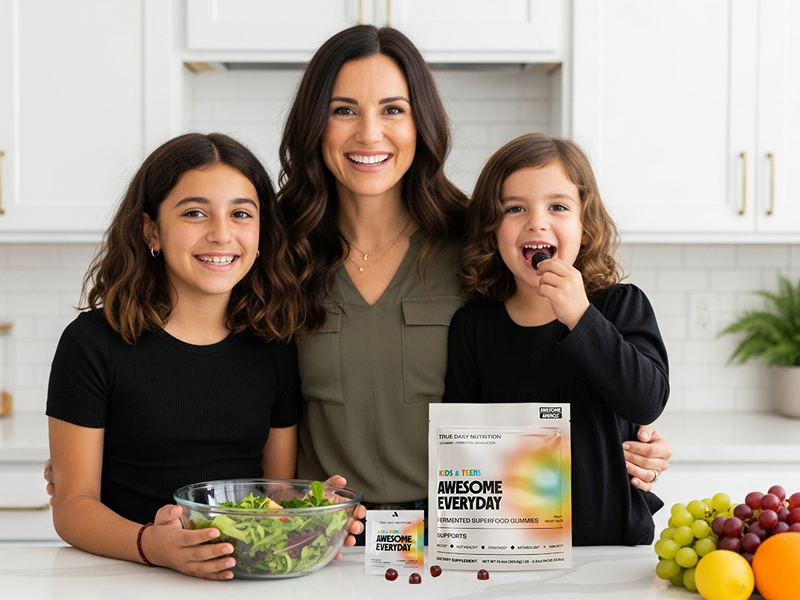In a world full of carbs and processed snacks, we overlook a critical gap in our children’s nutrition. They lack the necessary amino acids. The key to your child's learning, energy, and resilience lies in them.
These tiny molecules are the building blocks of life. They are the foundation on which children learn, grow, and thrive. Without them, the brain, body, and immune system can’t perform at their best. And most modern diets don’t supply enough of them.

What are amino acids?
Think of amino acids as your body’s Lego pieces. Out of 20 total amino acids, 9 are essential. Meaning your body can’t make them on its own. They must come from a food source.
Each one plays a specific role:
- BCAAs (leucine, isoleucine, valine) help build and repair muscles. They also support recovery and provide long-lasting energy.
- Lysine supports hormones, growth, and a strong immune system.
- Tryptophan helps the body make serotonin and melatonin for mood balance and sleep.
- Histidine, methionine, threonine, and phenylalanine promote tissue repair, detoxification, and brain function.
When kids don’t get enough aminos, they slow down. Their brains can’t make neurotransmitters like dopamine or serotonin. These neurotransmitters are “messenger” chemicals responsible for learning, focus, or calm energy.
How do amino acids boost learning and brain development?
Most people might not know this, but our brains function on amino acids. They’re the raw materials that create neurotransmitters, the brain’s messengers such as serotonin for calm, dopamine for focus, and melatonin for sleep.
Without enough amino acids, even a healthy diet can be lacking. This leaves the child feeling foggy, irritable, or unfocused.
Certain amino acids, such as leucine and arginine, also activate the mTOR pathway. It is a critical signal for brain growth and memory formation. That is how balanced amino acid intake supports sharper thinking and emotional balance.
What role do amino acids play in energy and growth?
You might notice that some kids seem to run out of energy halfway through the day. Often, the problem isn’t energy; it’s missing amino acids.
Amino acids are central to energy metabolism. They help the body convert nutrients into ATP. The body can break down proteins into amino acids to generate energy and support growth.
BCAAs are important because they help keep energy levels steady and reduce tiredness. They boost growth hormone, which helps kids build strong muscles and recover faster.
With enough EAAs, children enjoy better stamina and quicker recovery. Plus, they experience steady energy throughout the day. Perfect for learning, play, and growth for a young child.

How do amino acids strengthen immunity?
Strong immunity is the key to a strong and healthy mind. For that, immune cells should have a steady intake of amino acids. Amino acids such as glutamine, arginine, and cysteine give energy to immune cells. They help the body make antibodies and fight infections.
When intake is low, the immune response slows down, making kids more likely to get sick and recover slowly. Consistent amino acid intake helps the immune system stay ready. This, in turn, makes the body resilient from the inside out.
How can you ensure an adequate intake?
Ensuring adequate intake primarily starts with a whole-foods diet. Diet Rich in natural sources of protein and essential nutrients, such as eggs, fish, beans, and lean meats.
The main challenge often lies with children's preferences for less nutritious foods like snacks. To bridge this gap, parents should employ strategies to introduce and encourage healthy eating.
For days when dietary efforts fall short, a targeted nutritional supplement is an effective way to fill the gaps. Awesome Everyday offers all 9 amino acids and organic produce, guaranteeing children receive complete daily nutrition simply and easily.
It’s an easy way to fill nutritional gaps while keeping things pure, safe, and simple. It’s best to consult a pediatrician before starting.
Is supplementing with amino acids safe?
Absolutely, when done right. Always check with your child’s healthcare provider before starting any supplement. Avoid single amino acid doses, which can upset the body’s balance.
Products that include all 9 essential amino acids in the right balance are the best choice. When combined with supporting nutrients, they’re safe and effective. Formulas like Awesome Everyday for teens provide complete and balanced support. They’re made to help both kids and adults stay healthy and strong. Consult a pediatrician before starting.
FAQs
Q. Are amino acids safe for kids?
Yes, when provided in balanced, complete, and tested formulations.
Q. Do amino acids improve mood and focus?
Yes, they help make brain chemicals like serotonin and dopamine that support calmness and attention.
Q. How are amino acids different from vitamins?
Vitamins help your body’s reactions, while amino acids build what your body needs. In short, vitamins support the process, but amino acids create the structure.
Key Takeaway
If there’s one thing every parent should know, it’s that amino acids are the hidden foundation of growth. They fuel your child’s learning, focus, energy, and immune strength.
Amino acids help maintain neurotransmitters that support mood and memory. They also give every cell in the body steady, lasting energy. When kids don’t get enough, their bodies and minds can’t perform at their best.
That’s why ensuring a steady intake is important. Eating nutrient-rich foods helps your child stay healthy. Taking a complete supplement like Awesome Everyday can make an even bigger difference. It’s not about physical growth; it’s about helping your child stay focused, happy, and resilient.
Because when their nutrition is complete, they don’t grow; they thrive.
Reviewed by
Koohzad Karimi, DO
Board Certified Family Medicine
Doctor of Osteopathic Medicine
Master’s in Biomedical Science
Disclaimer: It’s best to consult a paediatrician before starting any new supplement.


